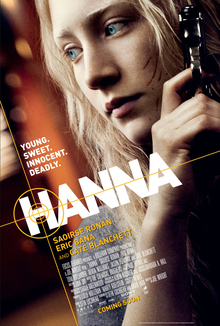Goldarn, but it's shiny. Hanna
is the ultimate argument for style over substance, and it's a
compelling argument indeed. Joe Wright's fourth feature may well be
the best-shot film of 2011 not directed by Terence
Malick, and its score - given the same level of prominence as
Wright on the poster to your left - is used in ways that boggle and
delight the mind in equal measure.
If Hanna's successes all lie in gorgeous images and sounds,
and not in an engaging story - well, what of it? Any argument based
on the admitted flimsiness of the film's narrative risks becoming
anti-cinematic if it doesn't acknowledge that meaning is communicated
by visuals as much as it is by conventional storytelling. It's clear
from Wright's directorial choices, though, that Hanna is not some
bold formal experiment. It's just a little underwritten, and that's a
darn shame.
Sixteen-year-old Hanna (Saoirse Ronan) lives in the wilderness of
northern Finland with her father, Erik Heller (Eric Bana), a spy gone
rogue. Having never seen civilisation, she's been raised to hunt,
fight, and survive, and Erik has drilled her in languages and
elaborate fake backstories. One day, Hanna realises she's 'ready',
and Erik, with a heavy heart, allows her to press the big red button
that will alert the CIA, from whom they've been hiding all these
years, to their presence.
I adore this plot point beyond words. The fact that our heroes
have been waiting all these years until they felt ready to start the
plot with the push of a button gives the film something deliberate,
makes us realise that while we like Hanna and Erik, they're
nonetheless skilled and dangerous professionals. At this point,
recall, we don't know what it is that they're choosing to
unleash.
We soon find out, though. Erik's former handler, Marissa Wiegler
(Cate Blanchett), sends out her goons, and they nab Hanna without
finding Erik. In custody at an underground base, Hanna,
underestimated by her captors, kills Marissa's body double (Michelle
Dockery) and flees the base in a sequence that (a) is thrilling and exciting and (b) will induce epilepsy, if you're in an at-risk group. On
the surface she realises she's in Morocco and must find her way to
Berlin, where she's hoping to meet her father.
The score by the Chemical Brothers was heavily advertised, and it
deserves the hype. Their neo-psychedelic electronica is pretty much
perfect, propulsive while being eerie enough to be more than standard
action music; Edvard Grieg's 'In
the Hall of the Mountain King' is also used to great effect.
It's not just the 'what', though, it's the 'how'. Not since
Koyaanisqatsi
- an experimental feature without narration, dialogue, or what you'd
conventionally call plot - have I seen a film in which the beats of
the scenes are dictated by music to such an extent. The action seems
to serve the score, not the other way around.
We have Paul Tothill, a longtime Joe Wright collaborator, to thank
for that: in his hands, Hanna is a wondrously taut,
well-edited film, lapsing into manic rushes at just the right times
and achieving serenity in others (the terrific scene in which Hanna,
who's never experienced music before watches a Spanish dancer comes
to mind). Wright himself is not as self-consciously ambitious as he
was in 2007's Atonement,
and that's a good thing: he's learnt to resist the temptation of
flashiness.
Hanna is a visual wonder thanks to cinematographer Alwin
Küchler's, who also shot the equally gorgeous Sunshine
(2007). Unlike his earlier work, though, Küchler uses a much more
subdued palette here, preferring blues and greens (there is, you'll
be unsurprised to hear, a lot of turquoise). He emphasises Ronan's
paleness and blue eyes through desaturation and lighting: the girl's
almost-white face transports both vulnerability and, at the right
times, menace.
You'll recall that around the same time Hanna was released
Sucker Punch,
another attempt to do substance by style, fell
painfully flat. That Hanna does not suffer the same
fate we can credit to Ronan, a young actress who really should be a
much bigger star. Despite a distracting Teutonic accent she creates
Hanna as a full human being - more importantly, a teenage girl. While
the 'Hanna doesn't know how to interact socially' scenes are among
the least successful, the same stretch of the film sees her reaching
out to another girl her age, Sophie (Jessica Barden). The tender
ambiguity of their relationship brings out the human longing for
intimacy that underlies both friendship and romance in a character
that, having grown up alone, has not had the social experience to
distinguish the two.
Even as it falls flat in the story department (a final-act twist
is both implausible and kind of lame) and suffers from Cate
Blanchett's worst performance since Indiana
Jones and the Kingdom of the Crystal Skull, then, Hanna
absolutely succeeds as a character study thanks to Ronan. Its
cinematography and use of music are quite unlike anything you'll have
seen before: and thus, while by no means flawless, Hanna is
one of the most arresting and intriguing films of the year.

I must say I enjoyed the first half of this film, as well as its climax. I should point out that Tron:L was maybe equally score-driven. Good review, you made me appreciate the second act.
ReplyDeleteFor me, one of the most amazing things about it was that it was a spy/action thriller with strong female lead protagonists and antagonists... and without a catsuit in sight, or indeed any form of ZOMG LOL LOOK IT IS GIRL WITH GUN syndrome. Possibly one of the most brilliantly egalitarian action films I have ever seen and I am honestly surprised you didn't pick up on that!
ReplyDelete